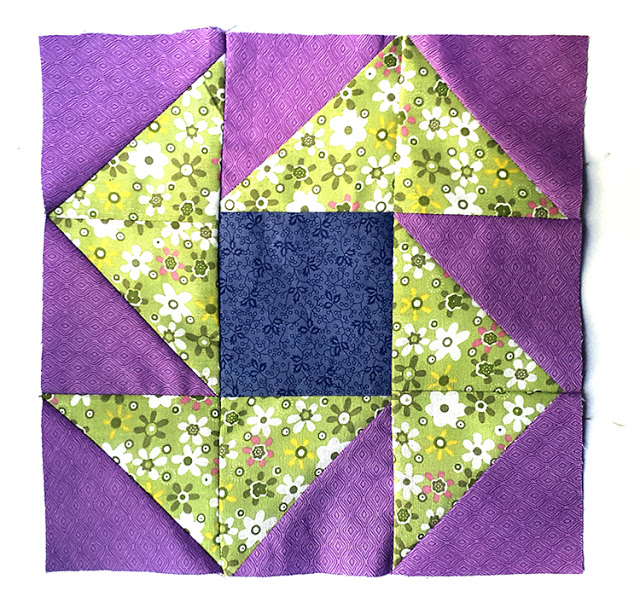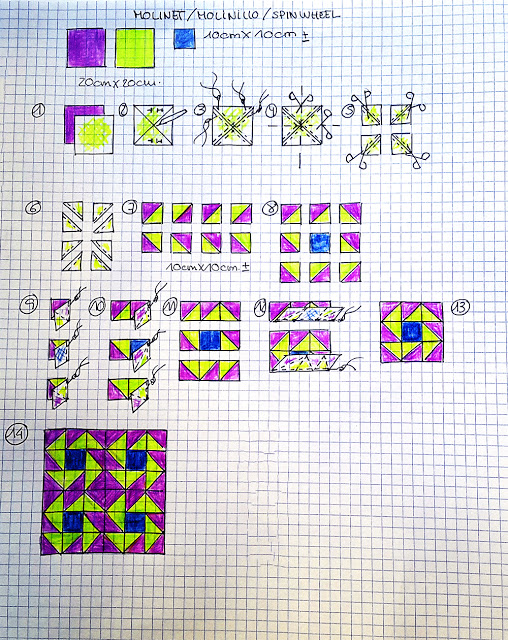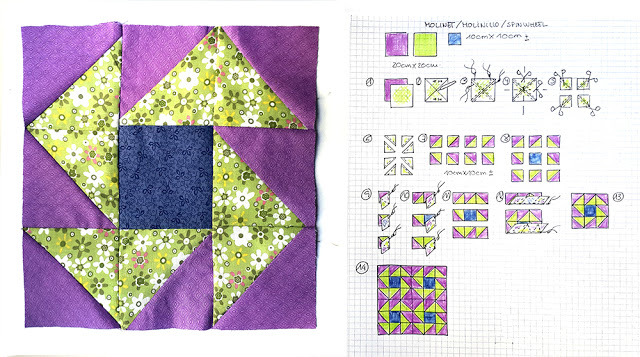UN MOLINET MÉS: TUTORIAL DE PATCHWORK.
Les Antònies no parem de cercar i investigar per poder oferir-vos maneres diferents de muntar blocsde patchwork. En aquesta ocasió us presentem un altre molinet fet amb una tècnica molt senzilla i que us servirà per crear més blocs diferents.
Només farem servir 3 teles diferents. Necessitem 2 quadrats de 20cmX20cm de teles contrastades per formar els quadrats amb triangle i 1 quadrat de, més o menys 10cmX10cm d’una totalment diferent de les altres dues. Per aquest quadrat més petit, tingueu en compte que les mesures poden canviar a 9’50cm o 9cm, depenent de la mesura final dels quadrats amb triangle, però a partir dels 10 podeu adaptar més acuradament la mesura que necessitareu.
Comencem el tutorial. Encarem els dos quadrats grans (1), els fixem amb agulles i dibuixem al darrere d’un, amb llapis, dues línies diagonals (2); cosim una costura a cada banda de les diagonals dibuixades (3); tallem pel centre del quadrat en vertical i horitzontal (4) i retallem per la línia dibuixada de cada un dels 4 quadrats obtinguts (5) Ja tenim 8 triangles (6). Obrim, planxem i quadrem (7).
Abans de muntar el bloc, adaptem el quadrat de 10cmX10cm a les mesures dels 8 quadrats amb triangle, que han de ser tots iguals, retallant el sobrant. Col·loquem tots els quadrats com podeu veure al dibuix (8) i comencem a unir les parts: cosim, filera a filera, el segon quadrat al primer (9) i el tercer quadrat als dos anteriors (10). Ja tenim les fileres cosides (11) i procedim a unir-les: cosim la filera central a la primera i la tercera a les dues anteriors (12). Ja hem acabat el nostre nou molinet (13). Us deixem un exemple de com quedarien 4 blocs units (14).
Ja veieu que és una manera molt simple d’aconseguir un bloc molt bonic i espectacular, depenent de la manera que combineu les teles i els colors dels vostres treballs. Esperem que us agradi i que el nostre tutorial us sigui útil.
GIRANT I GIRANT SENSE PARAR!!!
UN MOLINILLO MÁS: TUTORIAL DE PATCHWORK.
Les Antònies no paramos de buscar e investigar para poder ofreceros maneras diferentes de montar bloques de patchwork. En esta ocasión os presentamos otro molinillo hecho con una técnica muy sencilla y que os servirá para crear más bloques diferentes.
Solo usaremos 3 telas diferentes. Necesitamos 2 cuadrados de 20cmX20cm de telas contrastadas para formar los cuadrados con triangulo y 1 cuadrado de, más o menos 10cmX10cm de una totalmente diferente de las otras dos. Para este cuadrado más pequeño, tened en cuenta que las medidas pueden cambiar a 9’50cm o 9cm, dependiendo de la medida final de los cuadrados con triangulo, pero a partir de los 10 podéis adaptar mes exactamente la medida que necesitaréis.
Comenzamos el tutorial. Encaramos los dos cuadrados grandes (1), los fijamos con alfileres y dibujamos detrás de uno, con lápiz, dos líneas diagonales (2); cosemos una costura a cada lado de las diagonales dibujadas (3); cortamos por el centro del cuadrado en vertical y horizontal (4) y recortamos por la línea dibujada de cada uno de los 4 cuadrados obtenidos (5) Ya tenemos 8 triángulos (6). Abrimos, planchamos y cuadramos (7).
Antes de montar el bloque, adaptamos el cuadrado de 10cmX10cm a las medidas de los 8 cuadrados con triangulo, que han de ser todos iguales, recortando lo que sobra. Colocamos todos los cuadrados como podéis ver en el dibujo (8) y empezamos a unir las partes: cosemos, hilera a hilera, el segundo cuadrado al primero (9) y el tercer cuadrado a los dos anteriores (10). Ya tenemos las hileras cosidas (11) y procedemos a unirlas: cosemos la hilera central a la primera y la tercera a las dos anteriores (12). Ya hemos acabado nuestro nuevo molinillo (13). Os dejamos un ejemplo de cómo quedarían 4 bloques unidos (14).
Ya veis que es una manera muy simple de conseguir un bloquemuy bonito y espectacular, dependiendo de la manera que combinéis las telas y los colores de vuestros trabajos. Esperamos que os guste y que nuestro tutorial os sea útil.
¡¡¡GIRANDO Y GIRANDO SIN PARAR!!!
ONE MORE PINWHEEL: PATCHWORK TUTORIAL.
Les Antònies do not stop to find and research in order to provide you with different ways to mount patchwork blocks. On this occasion we present another very simple technique with a pinwheel and will serve to create more different blocks.
We will only use 3 different fabrics. We need 2 20cmX20cm squares of contrasting fabrics to form squares with triangle and 1 10cmX10cm square, more or less, completely different from the other two. For this smaller square, bear in mind that the measures can be changed to 9″50cm or 9cm, depending on the final measure of the squares with triangle, but from the 10 you can adapt month exactly as you need.
We start the tutorial. Let»s face the two large squares (1), fix with needles and draw on the back of one, with pencil, two diagonal lines (2); sew a seam on each side of the diagonals drawn (3); we cut through the centre of the square in vertical and horizontal (4) and we cut to the line drawn for each of the 4 squares obtained (5) already have 8 triangles (6). Open, iron and trim (7).
Before you set up the block, we adapt the 10cmX10cm square to measurements of the 8 squares with triangle, which should be all equal, trimming the excess. Place all of the squares as you can see in the drawing (8) and we start to unite the parts: sew, row on row, the second square on the first (9), and the third square the previous two (10). We already have the rows sewn (11) and proceed to join them: sew the row in the first and third in the previous two (12). We have already finished our new pinwheel (13). We show an example of how would united 4 blocks(14).
As you can see it is a very simple way to get a very nice and spectacular block, depending on the way you combine fabrics and colours of your work. We hope that you like it and our tutorial will be useful to you.
TWIRLING AND SPINNING ENDLESSLY!!!










